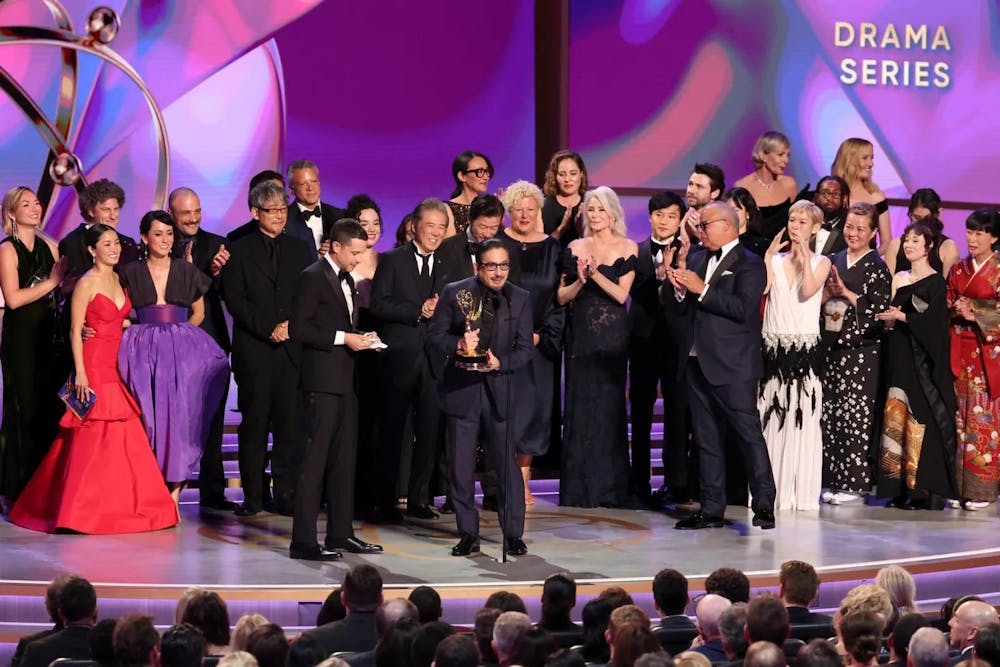Continuing a years-long trend of subpar awards shows, the 76th Emmy Awards on Sunday was a largely unamusing and excruciatingly dull three hours.
The predictability of winners contributed to the show’s overall dryness. “The Bear,” which received a record-breaking 23 nominations as a comedy series, won 11 awards. And, as expected, the most nominated show “Shōgun” — receiving a whopping 25 nominations — won the most awards of the night, racking up 18 trophies.
One of the only major upsets of the night was “The Bear” losing to “Hacks” in the Outstanding Comedy Series category. Although surprising, the victory of “Hacks” is understandable. Unlike “The Bear,” a drama series with integrated elements of dark comedy, “Hacks” is unambiguously comedic and truly encompasses the nature of its content.
Hosted by father-son actor duo Eugene and Dan Levy, the ceremony frequently fell flat in its attempts to amuse both its live and television audiences. The presentation for the Outstanding Supporting Actor in a Comedy Series award consisted of an oddly placed advertisement and a chaotic attempt at humor. While presenting the award, “Only Murders in the Building” stars Steve Martin, Martin Short and Selena Gomez were abruptly interrupted twice by an audio recording of Shingles vaccine Shingrix’s slogan, “Shingles Doesn’t Care.”
Another more painful segment happened right before “It’s Always Sunny in Philadelphia’s” Kaitlin Olson and Rob McElhenney presented Liza Colón-Zayas with the award for Outstanding Supporting Actress in a Comedy Series for her performance in “The Bear.” The duo started their bit with an analogy likening supporting roles to jockstraps, but their delivery of the innuendos in such a weird and awkward manner was reminiscent of the unpolished acting commonly seen in Disney Channel sitcoms.
Political comments and jabs were also made throughout the night. Most notably, when presenting the award for Outstanding Lead Actress in a Comedy Series — won by Jean Smart for “Hacks” — Candice Bergen mentioned how former Vice President Dan Quayle was upset by her portrayal of a single mother in the ‘80s sitcom “Murphy Brown.” Bergen then took a dig at Republican Vice Presidential candidate JD Vance, joking, “Today, a Republican candidate for Vice President would never attack a woman for having kids. So, as they say, my work here is done. Meow!”
But, the delivery of this presentation may have been slightly better for Brown students — Maiya Jannah ’25 was the trophy presenter for the category and handed Smart the award.
The ceremony’s monotony was also occasionally alleviated by memorable reunions and nostalgic moments. During special segments, presenters delivered tributes to various groups represented on television: moms, dads, doctors and even villains. Recognizable faces, such as Kathy Bates, Mindy Kaling and Viola Davis, among others, made appearances during these sequences.
A reunion of present and former SNL cast members Seth Meyers, Maya Rudolph, Kristen Wiig and Bowen Yang for the show’s 50th anniversary was also a welcome segment — though it was littered with unsuccessfully delivered jokes about Lorne Michaels, the creator of SNL.
For her performance as Toda Mariko in “Shōgun,” Anna Sawai became the first Asian actress to win the award for Outstanding Lead Actress in a Drama Series. One of the ceremony’s highlights, Sawai received her award in tears and dedicated her win to “all the women who expect nothing and continue to be an example for everyone” before leaving the stage.
As expected, “Shōgun” itself won the award for Outstanding Drama Series, becoming the first non-English language series to win in the category. Hiroyuki Sanada — who had won the award for Outstanding Lead Actor in a Drama Series earlier in the ceremony — delivered one of the best acceptance speeches of the night in Japanese.
“We would like to express our deepest gratitude to all the crew, directors and masters who have inherited and supported our samurai period dramas up until now. The passion and dreams that we have inherited from you have crossed oceans and borders,” Sanada remarked.
Ironically, a ceremony that honors the best in television was ultimately an example of bad television itself. Jam-packed with awards and numerous dry monologues, there was insufficient time for the award winners to truly express their gratitude beyond reciting flurries of “thank you’s”. With so many talented writers, actors and directors, there should be no reason for one of the biggest award shows in entertainment to have a ceremony so bland and unremarkable.
Manav is a junior from Indiana, concentrating in International and Public Affairs. In his free time, he likes attempting the daily Connections puzzle or falling down Wikipedia rabbit holes.





